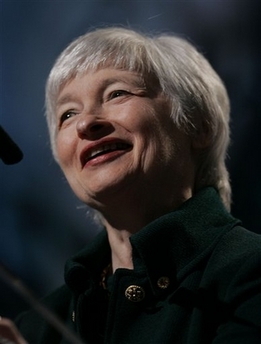Fed officials see recession in all but name
(Agencies)
Updated: 2008-04-17 08:15
Updated: 2008-04-17 08:15
ALAMEDA - Two top Federal Reserve officials on Wednesday described the US economy as extremely weak -- whether or not it is technically in recession -- but also said inflation was a concern.
 Janet L. Yellen, President and CEO of the Federal Reserve Bank of San Francisco, speaks about foreclosures to the Bay Area Council Outlook Conference in Alameda, Calif., Wednesday, April 16, 2008. Yellen said the mortgage crisis and financial services turmoil are likely to be a 'major drag' on the national economy into 2009. [Agencies] |
San Francisco Federal Reserve Bank President Janet Yellen said economic prospects are "unusually uncertain," with growth "at best" at a crawl.
"The economy has all but stalled and could even contract over the first half of the year," Yellen said in a speech to the Bay Area Council's economic outlook conference.
"I'm not ruling out a recession," she told reporters later. The ultimate designation of a recession -- two straight quarters of negative growth -- is mostly a technicality, Yellen said.
Across the country, Charles Plosser, president of the Philadelphia Federal Reserve Bank, said the economy "feels pretty bad," regardless of whether a recession is declared.
Growth prospects are weak, and the slowdown will have consequences for everything from jobs to production, Plosser told reporters after a speech in Blue Bell, Pennsylvania, north of Philadelphia.
The downbeat comments echoed those from the Fed's Beige Book assessment of economic conditions between March 5 and April 7, released on Wednesday.
The Beige Book said economic conditions were worsening across much of the nation even while food, fuel and raw material prices are increasing.
The dreaded "R" word -- recession -- was mentioned for the first time in years, quoting one Boston district contact as saying a recession "probably started in December" for retailers.
"The Beige Book either portrayed a slowdown in already sub-par economic conditions, or a deepening recession," said Michael Gregory, senior economist at BMO Capital Markets in Toronto.
Also on Wednesday, Federal Reserve Governor Frederic Mishkin told a Senate panel that small businesses, a major generator of jobs in the US economy, will find it harder and more costly to borrow money as financial market turmoil persists.
INFLATION A PROBLEM
Plosser and Yellen, who sit at opposite ends of the Fed's ideological spectrum, both restated their concern about inflation, which is running high enough for some Fed watchers to suspect the central bank will go slow on any additional interest rate cuts.
Mishkin on Wednesday told the Senate Small Business committee that the Fed could lower rates further if needed.
"Clearly you can't get interest rates below zero ... but we actually have interest rates now at 2-1/4 percent and clearly there is some room to lower them if it's needed," Mishkin said.
Plosser, who last month voted against the move by the policy-setting Federal Open Market Committee to cut the benchmark federal funds rate by three-fourths of a percentage point, said, "Inflation is a concern, I've been saying that for some time."
Dallas Fed President Richard Fisher also voted against the cut, a rare double dissent.
|
||
|
||
|
|
|
|

